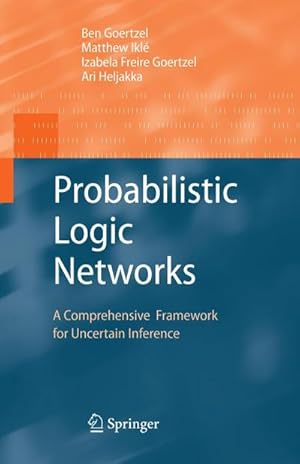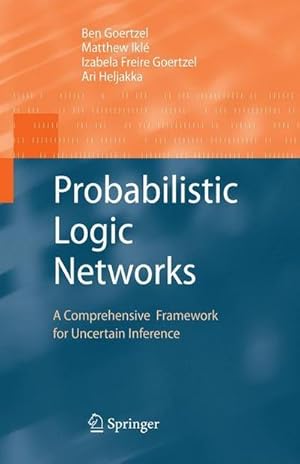Probabilistic Logic Networks Comprehensive by Goertzel Ben (18 results)
Search filters
Product Type
- All Product Types
- Books (18)
- Magazines & Periodicals (No further results match this refinement)
- Comics (No further results match this refinement)
- Sheet Music (No further results match this refinement)
- Art, Prints & Posters (No further results match this refinement)
- Photographs (No further results match this refinement)
- Maps (No further results match this refinement)
- Manuscripts & Paper Collectibles (No further results match this refinement)
Condition Learn more
- New (13)
- As New, Fine or Near Fine (5)
- Very Good or Good (No further results match this refinement)
- Fair or Poor (No further results match this refinement)
- As Described (No further results match this refinement)
Binding
Collectible Attributes
- First Edition (No further results match this refinement)
- Signed (No further results match this refinement)
- Dust Jacket (No further results match this refinement)
- Seller-Supplied Images (10)
- Not Print on Demand (16)
Language (1)
Price
- Any Price
- Under £ 20 (No further results match this refinement)
- £ 20 to £ 35 (No further results match this refinement)
- Over £ 35
Free Shipping
Seller Location
Seller Rating
-
Probabilistic Logic Networks: A Comprehensive Framework for Uncertain Inference
Seller: ALLBOOKS1, Direk, SA, Australia
£ 102.93
Convert currencyFree shipping from Australia to U.S.A.Quantity: 1 available
Add to basketBrand new book. Fast ship. Please provide full street address as we are not able to ship to P O box address.
-
Probabilistic Logic Networks : A Comprehensive Framework for Uncertain Inference
Seller: GreatBookPrices, Columbia, MD, U.S.A.
Condition: New.
-
Probabilistic Logic Networks : A Comprehensive Framework for Uncertain Inference
Seller: GreatBookPrices, Columbia, MD, U.S.A.
Condition: New.
-
Probabilistic Logic Networks: A Comprehensive Framework for Uncertain Inference
Seller: Lucky's Textbooks, Dallas, TX, U.S.A.
Condition: New.
-
Probabilistic Logic Networks: A Comprehensive Framework for Uncertain Inference
Seller: Lucky's Textbooks, Dallas, TX, U.S.A.
Condition: New.
-
Probabilistic Logic Networks: A Comprehensive Framework for Uncertain Inference
Seller: Ria Christie Collections, Uxbridge, United Kingdom
£ 134.13
Convert currency£ 11.98 shipping from United Kingdom to U.S.A.Quantity: Over 20 available
Add to basketCondition: New. In.
-
Probabilistic Logic Networks : A Comprehensive Framework for Uncertain Inference
Seller: GreatBookPrices, Columbia, MD, U.S.A.
Condition: As New. Unread book in perfect condition.
-
Probabilistic Logic Networks : A Comprehensive Framework for Uncertain Inference
Seller: GreatBookPrices, Columbia, MD, U.S.A.
Condition: As New. Unread book in perfect condition.
-
Probabilistic Logic Networks : A Comprehensive Framework for Uncertain Inference
Seller: GreatBookPricesUK, Woodford Green, United Kingdom
£ 144.07
Convert currency£ 15 shipping from United Kingdom to U.S.A.Quantity: Over 20 available
Add to basketCondition: New.
-
Probabilistic Logic Networks : A Comprehensive Framework for Uncertain Inference
Seller: GreatBookPricesUK, Woodford Green, United Kingdom
£ 152.10
Convert currency£ 15 shipping from United Kingdom to U.S.A.Quantity: Over 20 available
Add to basketCondition: As New. Unread book in perfect condition.
-
Probabilistic Logic Networks: A Comprehensive Framework for Uncertain Inference
Seller: Ria Christie Collections, Uxbridge, United Kingdom
£ 184.13
Convert currency£ 11.98 shipping from United Kingdom to U.S.A.Quantity: Over 20 available
Add to basketCondition: New. In.
-
Probabilistic Logic Networks : A Comprehensive Framework for Uncertain Inference
Seller: AHA-BUCH GmbH, Einbeck, Germany
£ 149.03
Convert currency£ 54.19 shipping from Germany to U.S.A.Quantity: 2 available
Add to basketTaschenbuch. Condition: Neu. Druck auf Anfrage Neuware - Printed after ordering - Abstract In this chapter we provide an overview of probabilistic logic networks (PLN), including our motivations for developing PLN and the guiding principles underlying PLN. We discuss foundational choices we made, introduce PLN knowledge representation, and briefly introduce inference rules and truth-values. We also place PLN in context with other approaches to uncertain inference. 1.1 Motivations This book presents Probabilistic Logic Networks (PLN), a systematic and pragmatic framework for computationally carrying out uncertain reasoning - r- soning about uncertain data, and/or reasoning involving uncertain conclusions. We begin with a few comments about why we believe this is such an interesting and important domain of investigation. First of all, we hold to a philosophical perspective in which 'reasoning' - properly understood - plays a central role in cognitive activity. We realize that other perspectives exist; in particular, logical reasoning is sometimes construed as a special kind of cognition that humans carry out only occasionally, as a deviation from their usual (intuitive, emotional, pragmatic, sensorimotor, etc.) modes of thought. However, we consider this alternative view to be valid only according to a very limited definition of 'logic.' Construed properly, we suggest, logical reasoning may be understood as the basic framework underlying all forms of cognition, including those conventionally thought of as illogical and irrational.
-
Probabilistic Logic Networks : A Comprehensive Framework for Uncertain Inference
Published by Springer US, Springer US, 2008
ISBN 10: 0387768718 ISBN 13: 9780387768717
Language: English
Seller: AHA-BUCH GmbH, Einbeck, Germany
£ 149.03
Convert currency£ 55.06 shipping from Germany to U.S.A.Quantity: 1 available
Add to basketBuch. Condition: Neu. Druck auf Anfrage Neuware - Printed after ordering - Abstract In this chapter we provide an overview of probabilistic logic networks (PLN), including our motivations for developing PLN and the guiding principles underlying PLN. We discuss foundational choices we made, introduce PLN knowledge representation, and briefly introduce inference rules and truth-values. We also place PLN in context with other approaches to uncertain inference. 1.1 Motivations This book presents Probabilistic Logic Networks (PLN), a systematic and pragmatic framework for computationally carrying out uncertain reasoning - r- soning about uncertain data, and/or reasoning involving uncertain conclusions. We begin with a few comments about why we believe this is such an interesting and important domain of investigation. First of all, we hold to a philosophical perspective in which 'reasoning' - properly understood - plays a central role in cognitive activity. We realize that other perspectives exist; in particular, logical reasoning is sometimes construed as a special kind of cognition that humans carry out only occasionally, as a deviation from their usual (intuitive, emotional, pragmatic, sensorimotor, etc.) modes of thought. However, we consider this alternative view to be valid only according to a very limited definition of 'logic.' Construed properly, we suggest, logical reasoning may be understood as the basic framework underlying all forms of cognition, including those conventionally thought of as illogical and irrational.
-
Probabilistic Logic Networks: A Comprehensive Framework for Uncertain Inference
Seller: Mispah books, Redhill, SURRE, United Kingdom
£ 178
Convert currency£ 25 shipping from United Kingdom to U.S.A.Quantity: 1 available
Add to basketHardcover. Condition: Like New. Like New. book.
-
Probabilistic Logic Networks: A Comprehensive Framework for Uncertain Inference
Seller: Mispah books, Redhill, SURRE, United Kingdom
£ 191
Convert currency£ 25 shipping from United Kingdom to U.S.A.Quantity: 1 available
Add to basketPaperback. Condition: Like New. Like New. book.
-
PROBABILISTIC LOGIC NETWORKS: A Comprehensive Framework for Uncertain Inference
Published by Springer-Verlag New York Inc, 2008
ISBN 10: 0387768718 ISBN 13: 9780387768717
Language: English
Seller: Revaluation Books, Exeter, United Kingdom
£ 196.42
Convert currency£ 25 shipping from United Kingdom to U.S.A.Quantity: 2 available
Add to basketHardcover. Condition: Brand New. 1st edition. 344 pages. 9.20x6.10x0.80 inches. In Stock.
-
Probabilistic Logic Networks: A Comprehensive Framework for Uncertain Inference
Published by SPRINGER NATURE Nov 2010, 2010
ISBN 10: 1441945784 ISBN 13: 9781441945785
Language: English
Seller: BuchWeltWeit Ludwig Meier e.K., Bergisch Gladbach, Germany
£ 143.54
Convert currency£ 19.97 shipping from Germany to U.S.A.Quantity: 2 available
Add to basketTaschenbuch. Condition: Neu. This item is printed on demand - it takes 3-4 days longer - Neuware -Abstract In this chapter we provide an overview of probabilistic logic networks (PLN), including our motivations for developing PLN and the guiding principles underlying PLN. We discuss foundational choices we made, introduce PLN knowledge representation, and briefly introduce inference rules and truth-values. We also place PLN in context with other approaches to uncertain inference. 1.1 Motivations This book presents Probabilistic Logic Networks (PLN), a systematic and pragmatic framework for computationally carrying out uncertain reasoning - r- soning about uncertain data, and/or reasoning involving uncertain conclusions. We begin with a few comments about why we believe this is such an interesting and important domain of investigation. First of all, we hold to a philosophical perspective in which 'reasoning' - properly understood - plays a central role in cognitive activity. We realize that other perspectives exist; in particular, logical reasoning is sometimes construed as a special kind of cognition that humans carry out only occasionally, as a deviation from their usual (intuitive, emotional, pragmatic, sensorimotor, etc.) modes of thought. However, we consider this alternative view to be valid only according to a very limited definition of 'logic.' Construed properly, we suggest, logical reasoning may be understood as the basic framework underlying all forms of cognition, including those conventionally thought of as illogical and irrational. 336 pp. Englisch.
-
Probabilistic Logic Networks: A Comprehensive Framework for Uncertain Inference
Seller: moluna, Greven, Germany
£ 122.77
Convert currency£ 42.54 shipping from Germany to U.S.A.Quantity: Over 20 available
Add to basketKartoniert / Broschiert. Condition: New. Dieser Artikel ist ein Print on Demand Artikel und wird nach Ihrer Bestellung fuer Sie gedruckt. Provides a comprehensive framework for uncertain reasoning, integrating probability theory, predicate and term logic, and pattern theoryConsiders a broad scope of reasoning typesFuses rigorous mathematics with practical computation to descr.













